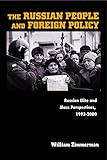The Russian People and Foreign Policy : Russian Elite and Mass Perspectives, 1993-2000 / William Zimmerman.
Material type: TextPublisher: Princeton, NJ : Princeton University Press, [2009]Copyright date: ©2002Edition: Course BookDescription: 1 online resource (248 p.)Content type:
TextPublisher: Princeton, NJ : Princeton University Press, [2009]Copyright date: ©2002Edition: Course BookDescription: 1 online resource (248 p.)Content type: - 9780691091686
- 9781400824991
- 305.520947
- HN530.2.Z9 E496 2002
- online - DeGruyter
- Issued also in print.
| Item type | Current library | Call number | URL | Status | Notes | Barcode | |
|---|---|---|---|---|---|---|---|
 eBook
eBook
|
Biblioteca "Angelicum" Pont. Univ. S.Tommaso d'Aquino Nuvola online | online - DeGruyter (Browse shelf(Opens below)) | Online access | Not for loan (Accesso limitato) | Accesso per gli utenti autorizzati / Access for authorized users | (dgr)9781400824991 |
Frontmatter -- Contents -- Acknowledgments -- Introduction -- Chapter 1. Elites, Attentive Publics, and Masses in Post-Soviet Russia -- Chapter 2. Politics and Markets, with Judith Kullberg -- Chapter 3. Elite-Mass Interactions, Knowledge, and Russian Foreign Policy -- Chapter 4. Orientations to the International System and Electoral Behavior in Russia -- Chapter 5. Elite Political-Economic Orientations and Foreign Policy -- Chapter 6. NATO Expansion Past and Future: A Closer Look -- Chapter 7. Conclusion -- Selected Bibliography -- Index
restricted access online access with authorization star
http://purl.org/coar/access_right/c_16ec
Since the fall of communism, public opinion in Russia, including that of a now more diverse elite, has become a substantial factor in that country's policymaking process. What this opinion might be and how it responds to American actions is the subject of this study. William Zimmerman offers important and sometimes disturbing insight into the thinking of citizens in America's former Cold War adversary about such matters as NATO expansion. Drawing on nearly a decade of unprecedented surveys he conducted with a wide spectrum of the Russian public, he gauges the impact of Russia's opening on its foreign policy and how liberal democrats orient themselves to foreign policy. He also shows that insights from the study of American foreign policy are often "portable" to the study of Russian foreign policy attitudes. As Zimmerman shows, the general public, which had a modest but real role in foreign policy decision making, tended much more toward isolationism than did the predominant elites who steered Russia's foreign policy in the 1990s. Interspersing smooth prose with a wide array of richly informative tables, the book represents an invaluable opportunity to discern probable shifts in Russian foreign policy that domestic political changes would bring. And it powerfully suggests that the West, by forging its own policies toward Russia with more prudence, can have a say in the outcome of the great choice facing Russia--whether to forge ahead with democracy or slip back into authoritarianism.
Issued also in print.
Mode of access: Internet via World Wide Web.
In English.
Description based on online resource; title from PDF title page (publisher's Web site, viewed 30. Aug 2021)


